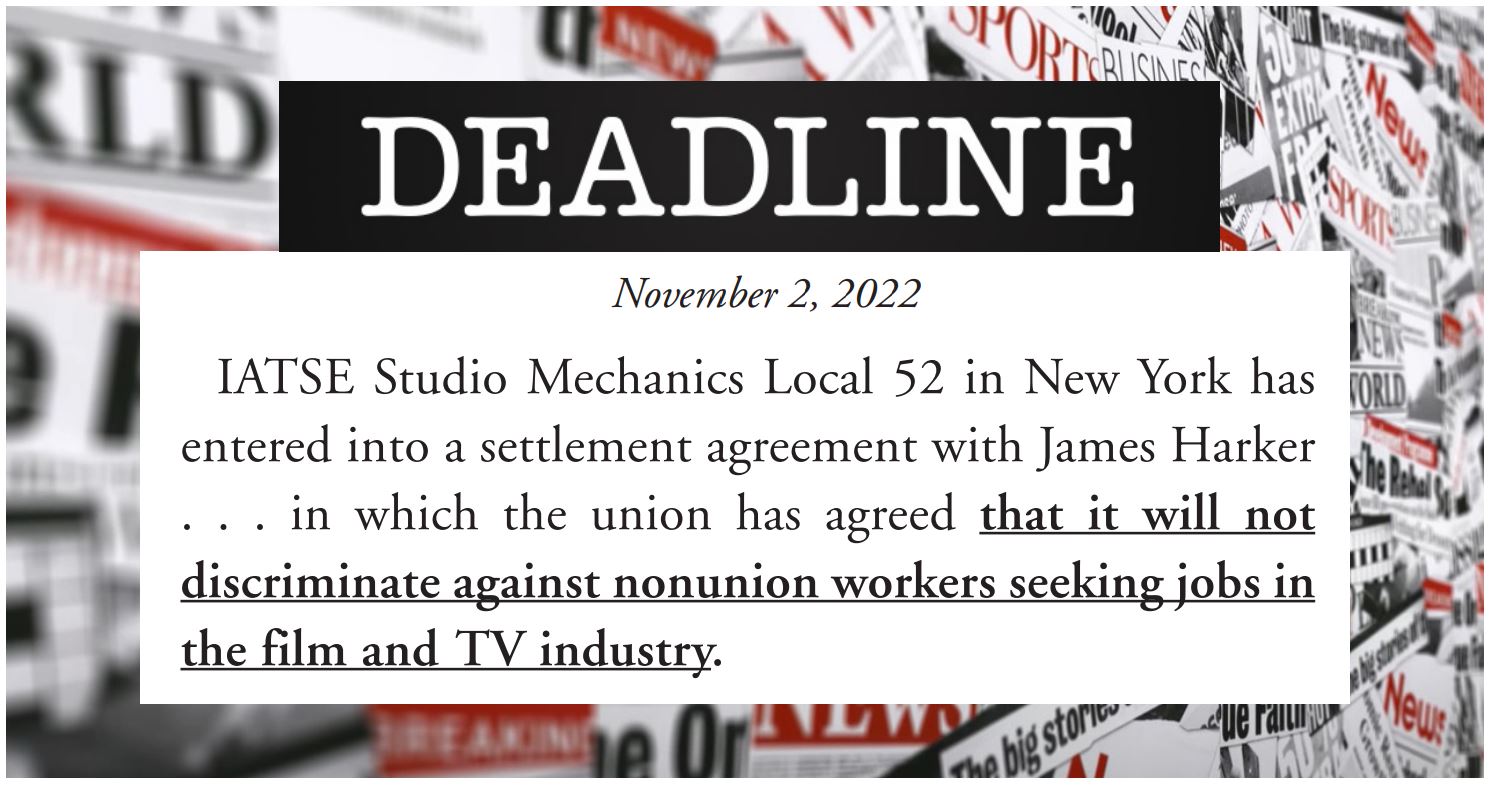The following article is from the National Right to Work Legal Defense Foundation’s bi-monthly Foundation Action Newsletter, January/February 2023 edition. To view other editions of Foundation Action or to sign up for a free subscription, click here.
Faced with prosecution, IATSE union bosses will stop ‘bumping’ non-members off film shoots
That’s a wrap: Movie electrician James Harker’s settlement ended an entrenched system of discrimination against non-members, perpetrated by IATSE union bosses.
NEW YORK, NY – James Harker, a New York-based movie production electrician, has a resume filled with big-name films that take place in the Big Apple, including Elf, Spider-Man 3, Men in Black II, and, recently, Steven Spielberg’s 2021 West Side Story.
But, while helping these and many other silver screen stories come to life, he witnessed a much more sinister plot unfolding among his fellow production workers. Production staff who were not International Alliance of Theatrical Stage Employees (IATSE) union members would often get “bumped” off of their positions on film shoots if union members became available and wanted those jobs, merely because the non-members lacked union membership.
Labor Board Agrees Film Production Union Committed Host of Violations
Many of his colleagues turned a blind eye to this so-called “bumping.” Though it was obviously discriminatory, it was an entrenched industry practice, and many were too afraid to challenge union bosses’ facilitation of the scheme. But in March 2021, Harker decided it was time to stand up, and he began a case that would soon end the practice.
Harker filed federal charges against the union in March 2021 and January 2022. In May 2022, National Labor Relations Board (NLRB) Region 29 in Brooklyn issued a complaint finding that many of the activities described in Harker’s charges were indeed violations of federal law. Harker then requested and received Foundation attorneys’ free legal aid.
The complaint was the NLRB’s first step toward prosecuting IATSE Local 52 not only for “bumping,” but also for forbidding production companies to hire non-members without permission from top union bosses, for forcing non-members to go through the union to apply for jobs, for requiring union members with hiring authority to exhaust all union member hiring options before hiring non-members, and for perpetrating other violations of federal labor law.
Following the complaint, rather than face National Right to Work Foundation staff attorneys who were providing Harker with free legal aid at trial, IATSE Local 52 union officials backed down and settled the case in October 2022 to avoid further prosecution.
Settlement Spells Final Act for Discrimination Against Non-members
The settlement orders IATSE Local 52 to comply with a number of requirements, including that union bosses will no longer “require nonmember . . . employees to obtain work through the Union,” “will not interfere with employers and their agents hiring nonmembers without first obtaining approval from the Union,” and “will not require employers to allow members to bump nonmembers off of productions because of the nonmembers’ lack of membership with the Union.”
The settlement also required IATSE union officials to attend mandatory training on employee rights and hiring procedures, and to distribute the NLRB notice broadly to members and non-members.
“IATSE union officials’ scheme to keep non-member production workers off the job is a classic example of union officials prioritizing power and control over workers’ individual rights,” commented National Right to Work Foundation Vice President and Legal Director Raymond LaJeunesse. “The Foundation was proud to back Mr. Harker, who recognized the patent injustice of this arrangement.”
“Film crew members who have exercised their right not to affiliate with a union should know that they can’t be required to go through union officials to look for work, and can’t be ‘bumped’ off a job just so a union member can get it,” LaJeunesse added. “Unfortunately, Foundation attorneys’ experience is that these types of unlawful schemes are pervasive in the entertainment industry, where near-total union boss control combined with the fear of union retaliation keeps most workers too scared to defend their rights.







